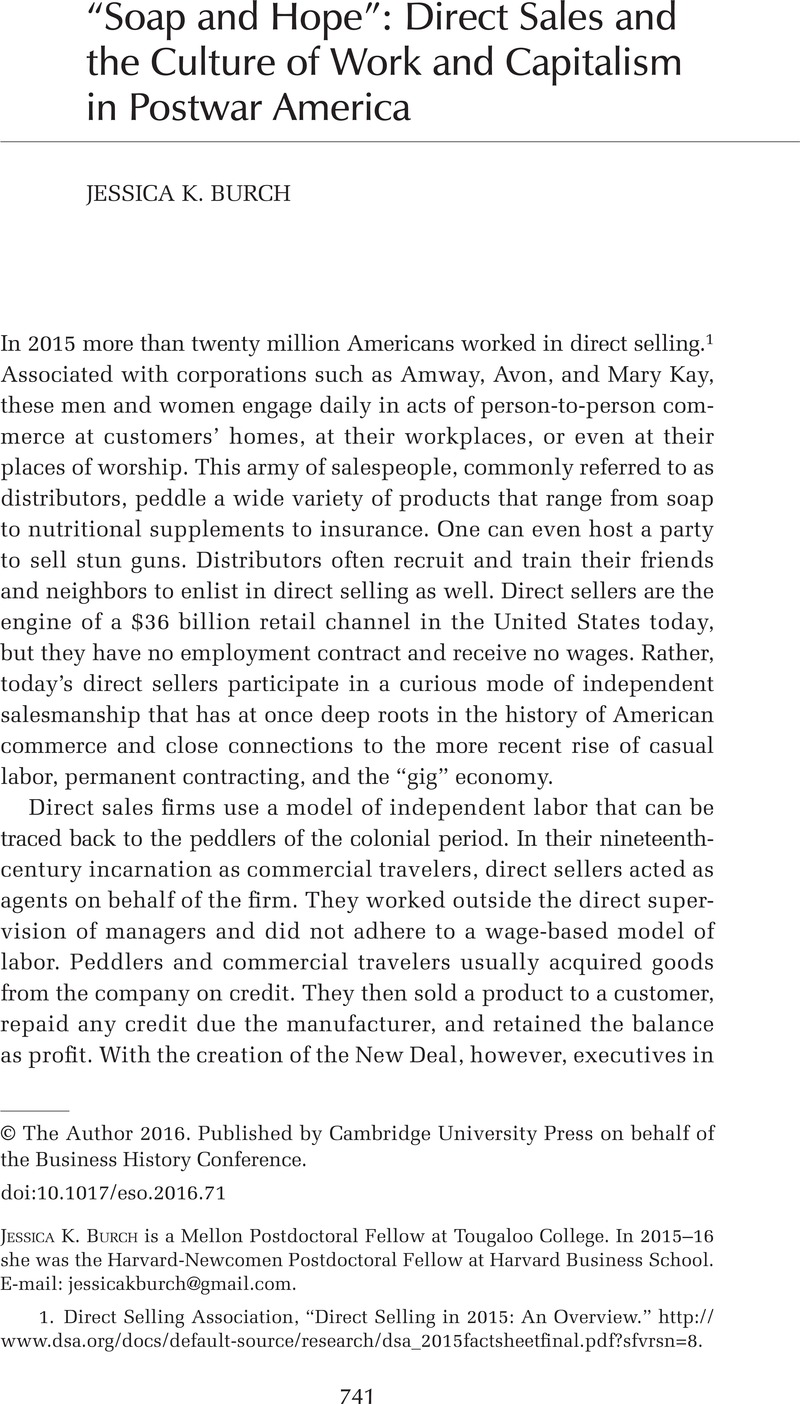Published online by Cambridge University Press: 14 November 2016

1. Direct Selling Association, “Direct Selling in 2015: An Overview.” http://www.dsa.org/docs/default-source/research/dsa_2015factsheetfinal.pdf?sfvrsn=8.
2. Nicole Woolsey Biggart, Charismatic Capitalism: Direct Selling Organizations in America (Chicago: University of Chicago Press, 1990); Alison J. Clarke, Tupperware: The Promise of Plastic in 1950s America (Washington, DC: Smithsonian Books, 2001); Kathy Peiss, Hope in a Jar: The Making of America’s Beauty Culture (Philadelphia: University of Pennsylvania Press, 2011); Katina Lee Manko, “‘Ding Dong! Avon Calling!’: Gender, Business, and Door-to-Door Selling, 1890–1995” (PhD diss., University of Delaware, 2001); Katina L. Manko, “‘Now You Are In Business for Yourself’: The Independent Contractors of the California Perfume Company, 1886–1938,” Business and Economic History 26, no. 1 (Fall 1997): 5–26. For transnational studies, see Lindsey Feitz, “Democratizing Beauty: Avon’s Global Beauty Ambassadors and the Transnational Marketing of Femininity, 1954–2010” (PhD diss., University of Kansas, 2010); Jessica Chelekis, “Direct Sales in the Amazon: Gender, Work, and Consumption in Ponta de Pedras, Pará, Brazil” (PhD diss., Indiana University, 2011); Theresa Preston-Werner, “The World in a Bottle: Gender, Age, and Direct Sales in Costa Rica” (PhD diss., Northwestern University, 2012); Gina Maria Grumke, “Desire, Wage Labor and Resistance: An Ethnography of a Sales Unit of Mary Kay Cosmetics, Inc.” (PhD diss., University of Wisconsin–Madison, 2001).
3. Roland Marchand, Advertising the American Dream: Making Way for Modernity, 1920–1940 (Berkeley: University of California Press, 1985); William R. Leach, Land of Desire: Merchants, Power, and the Rise of a New American Culture (New York: Vintage Books, 1994); Pamela Walker Laird, Advertising Progress and the Rise of Consumer Marketing (Baltimore, MD: Johns Hopkins University Press, 2001); Walter Friedman, Birth of a Salesman: The Transformation of Selling in America (Cambridge, MA: Harvard University Press, 2005).
4. Thurman W. Arnold, The Folklore of Capitalism (New Haven, CT: Yale University Press, 1937).
5. Jeffrey Sklansky, “The Elusive Sovereign: New Intellectual and Social Histories of Capitalism,” Modern Intellectual History 9, no. 1 (April 2012): 233–248, 234.
6. Federal Trade Commission Archives: Amway Corporation, The Amway Sales Plan (Ada: Amway Corporation, 1963), Binder 1-1/9023, Commission Exhibit 53: 111-240: 112, Amway Corporation, The American Way to Success (Ada: Amway Corporation, 1964), Binder 1-2/9023, Commission Exhibit 81: 1464-1479: 1466.
7. Robert R. Morris, Direct Selling Association, 1910–2010: 100 Years of Connecting People, Products and Opportunity (Washington, DC: Direct Selling Association, 2014). See also Biggart, Charismatic Capitalism, 33–40.
8. Biggart, Charismatic Capitalism, 51. Direct sales has likely always been underrepresented in statistical depictions of the national workforce. Even the best source on labor and population statistics, the United States Census, has relied on a quantitative methodology not conducive to tracking the itinerant, supplemental nature of direct selling. The dearth of quantitative historical data poses a challenge for historians, but it also provides an opportunity to explore issues of visibility, invisibility, and “what counts” in representations of the national economy.
9. Biggart, Charismatic Capitalism, 51, citing data from the Direct Selling Association.
10. Federal Trade Commission Archives: Amway Corporation, “1973 Amway Annual Report,” Amagram 15, no. 1 (January 1974), Binder 1-1/9023, Commission Exhibit 10: 23–42: 25; David L. Kuhn, A World of Opportunity (Ada: Amway Corporation, 2009), 92. These figures represent Amway’s global sales, the majority of which were, until 1987, attributable to U.S. and Canadian markets. In the latter-half of the 1970s, Amway was aggressively expanding overseas, making it difficult to determine, based on available data, the size of its U.S. business after 1976.
11. Fortune 500 database, Fortune Magazine: “1977 Archive List 101–200.” http://archive.fortune.com/magazines/fortune/fortune500_archive/full/1977/101.html.
12. Amway Corporation, “In These Uncertain Times, Amway Offers You Do-It-Yourself Job Security,” Time 103, no. 18 (May 6, 1974). See Rich DeVos, Compassionate Capitalism: People Helping People Help Themselves (New York: Plume Publishing, 1994); Jay Van Andel, An Enterprising Life: An Autobiography (New York: HarperCollins, 1998).
13. Hagley Museum and Library: Avon Collection, Avon Products Inc., 1977 Annual Report (New York: Avon Products, Inc., 1978), 8.
14. For an overview of taxonomies of entrepreneurship, see Martin Ruef, The Entrepreneurial Group: Social Identities, Relations, and Collective Action (Princeton: Princeton University Press, 2010): 3–17. See also Sharon A. Alvarez, Rajshree Agarwal, and Olav Sorenson, eds., Handbook of Entrepreneurship Research: Disciplinary Perspectives (New York: Springer, 2005).
15. In the Matter of Koscot Interplanetary, Inc. et. al. Order, Docket 8888, Complaint May 24, 1972—Final Order November 18, 1975. See also In the Matter of Holiday Magic, Inc. et al. Order, Docket 8834, Complaint, January 18, 1971—Decision, October 16, 1974.
16. In the Matter of Amway Corporation, Inc. et al. Final Order, Docket 9023, Complaint March 25, 1975—Final Order May 8, 1979.
17. Library of Congress, Audio-Visual Collection: Mike Wallace, “Soap and Hope,” 60 Minutes (CBS News), January 1983.
18. Steve Butterfield, Amway: The Cult of Free Enterprise (Boston: South End Press, 1985).
19. Michael Moore dir., Roger and Me (Warner Brothers), 1989.
20. Charisse Jones, “Direct Sales (like Avon, Mary Kay) Offer Recession-Proof Jobs,” USA Today, May 15, 2009, http://usatoday30.usatoday.com/money/industries/retail/2009-05-13-direct-sales-jobs-recession-unemployment_N.htm; William J. Clinton, “Opening Remarks to the Direct Selling Association Annual Meeting,” 1997, http://www.dsa.org/nonindexed/congresskit/index.html, http://www.dsa.org/nonindexed/congresskit/videos/clinton.mp4.